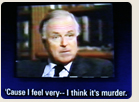
CALIFORNIA REPUBLICAN GUBERNATORIAL PRIMARY, 2002
At the end of 2001, California Gov. Gray Davis looked like he was in serious trouble, with a negative job rating brought about by his perceived handling of the state’s electricity problems. And the most formidable Republican lining up to take him on was recruited by none other than Karl Rove and the Bush White House itself – former Los Angeles Mayor Richard Riordan, a moderate Republican who had won twice in an overwhelmingly Democratic city. In a December 2001 survey by the respected, nonpartisan Field Poll, Riordan was leading Davis 43-36, with only 39 percent of voters indicating they were inclined to re-elect Davis (and even 33 percent of Democrats saying they would probably vote against the Democratic Governor).
Riordan launched his primary campaign by ignoring the other two GOP candidates, Sec. of State Bill Jones, the only Republican then in statewide office, and newcomer William E. Simon Jr., a businessman and son of former Nixon Treasury Secretary William Simon. In a fall ’01 Field Poll, Riordan sported a 27-point lead on Jones and a 41-point advantage over Simon. Riordan’s primary pitch to GOP primary voters was that as a Republican who supported a woman’s right to choose, he had the best chance of defeating Davis in this overwhelming pro-choice state.
But the Davis campaign, lead by Chief Strategist Garry South, turned the tables on Riordan by running $10 million worth of ads reminding voters of Riordan’s previous financial support for anti-abortion groups and his national chairmanship of the campaign to confirm the anti-Roe v. Wade Robert Bork to the Supreme Court. Then, just as Riordan vehemently protested, the coup de grace: a videotape of Riordan himself, a devout Catholic, telling a TV interviewer in 1991 that he “strongly” supported the Catholic Church’s opposition to abortion, calling it “murder.” South had acquired and squirreled away the videotape in 1993 when he worked as Communications Director for the candidate Riordan beat in the Los Angeles mayor’s race that year.
When the hypocrisy and mendacity of Riordan’s flip-flop soaked in, his support evaporated almost overnight among both pro-choice GOP women and anti-abortion activists, with both groups just concluding he was lying. “I’ve never seen so much movement in such a short period of time like this,” said Mark Baldassare, who conducts polling for the non-partisan Public Policy Institute of California. On Primary Election Day, Riordan received only 31 percent of the votes, buried by the novice Bill Simon, who got 49 percent.
Newsweek, in a story on the GOP primary upset titled “Southern Strategy,” called South “a one-man brain trust on the battlements of Fort California [who’s] shown a knack for foiling Rove’s plans.” Bruce Cain, Director of the Institute for Governmental Studies at UC Berkeley described South’s strategy to The New York Times as a “political hall of fame” move. South went on to direct Davis’s successful re-election effort, helping Davis become only the third Democratic Governor in the state’s history to win a second four-year term, and the first since Jerry Brown 24 years before.